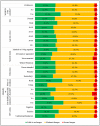Impact of household economic strengthening intervention on food security among caregivers of orphans and vulnerable children in Tanzania
- PMID: 35213627
- PMCID: PMC8880745
- DOI: 10.1371/journal.pone.0264315
Impact of household economic strengthening intervention on food security among caregivers of orphans and vulnerable children in Tanzania
Abstract
About 2 billion people worldwide suffer moderate or severe forms of food insecurity, calling for correctional measures involving economic strengthening interventions. This study assessed the impact of household economic strengthening (HES) intervention on food security among caregivers of orphans and vulnerable children (OVC) in Tanzania. The study was longitudinal in design, based on OVC caregivers' baseline (2017-2018) and midline (2019) data from the USAID Kizazi Kipya project. Food security, the outcome, was measured using the Household Hunger Scale (HHS) in three categories: little to no hunger (food secure), moderate hunger, and severe hunger. Membership in the USAID Kizazi Kipya-supported economic strengthening intervention (i.e. WORTH Yetu) was the main independent variable. Data analysis involved generalized estimating equation (GEE) for multivariate analysis. With mean age of 50.3 years at baseline, the study analyzed 132,583 caregivers, 72.2% of whom were female. At midline, 7.6% of all caregivers enrolled at baseline were members in WORTH Yetu. Membership in WORTH Yetu was significantly effective in reducing household hunger among the caregivers: severe hunger dropped from 9.4% at baseline to 4.1% at midline; moderate hunger dropped from 65.9% at baseline to 62.8% at midline; and food security (i.e., little to no hunger households) increased from 25.2% at baseline to 33.1% at midline. In the multivariate analysis, membership in WORTH Yetu reduced the likelihood of severe hunger by 47% (OR = 0.53, 95% CI 0.48-0.59), and moderate hunger by 21% (OR = 0.79, 95% CI 0.76-0.83), but increased the likelihood of food security by 45% (OR = 1.45, 95% CI 1.39-1.51). The USAID Kizazi Kipya's model of household economic strengthening for OVC caregivers was effective in improving food security and reducing household hunger in Tanzania. This underscores the need to expand WORTH Yetu coverage. Meanwhile, these results indicate a potential of applying the intervention in similar settings to address household hunger.
Conflict of interest statement
The authors have declared that no competing interests exist.
Figures




Similar articles
-
Multivariate mixed-effects ordinal logistic regression models with difference-in-differences estimator of the impact of WORTH Yetu on household hunger and socioeconomic status among OVC caregivers in Tanzania.PLoS One. 2024 Apr 16;19(4):e0301578. doi: 10.1371/journal.pone.0301578. eCollection 2024. PLoS One. 2024. PMID: 38626125 Free PMC article.
-
Hunger and Adherence to Antiretroviral Therapy: Learning From HIV Positive Caregivers of Orphans and Vulnerable Children in Tanzania.Front Public Health. 2022 Feb 21;9:719485. doi: 10.3389/fpubh.2021.719485. eCollection 2021. Front Public Health. 2022. PMID: 35265581 Free PMC article.
-
Relationship Between Food Insufficiency and HIV Infection Among Caregivers of Orphans and Vulnerable Children in Tanzania.HIV AIDS (Auckl). 2020 Jul 24;12:271-282. doi: 10.2147/HIV.S255549. eCollection 2020. HIV AIDS (Auckl). 2020. PMID: 32801926 Free PMC article.
-
Agripreneurship as a panacea for food security in Tanzania: A systematic review.Heliyon. 2023 Feb 1;9(2):e13305. doi: 10.1016/j.heliyon.2023.e13305. eCollection 2023 Feb. Heliyon. 2023. PMID: 36816280 Free PMC article. Review.
-
Transdisciplinary Project Communication and Knowledge Sharing Experiences in Tanzania and Zambia through a One Health Lens.Front Public Health. 2016 Feb 9;4:10. doi: 10.3389/fpubh.2016.00010. eCollection 2016. Front Public Health. 2016. PMID: 26904532 Free PMC article. Review.
Cited by
-
Factors affecting caregivers' participation in support groups for people living with HIV in Tanzania.Front Public Health. 2023 Sep 15;11:1215219. doi: 10.3389/fpubh.2023.1215219. eCollection 2023. Front Public Health. 2023. PMID: 37780441 Free PMC article.
-
Children of a syndemic: co-occurring and mutually reinforcing adverse child health exposures in a prospective cohort of HIV-affected mother-infant dyads in Cape Town, South Africa.J Int AIDS Soc. 2023 Oct;26 Suppl 4(Suppl 4):e26152. doi: 10.1002/jia2.26152. J Int AIDS Soc. 2023. PMID: 37909170 Free PMC article.
-
Multivariate mixed-effects ordinal logistic regression models with difference-in-differences estimator of the impact of WORTH Yetu on household hunger and socioeconomic status among OVC caregivers in Tanzania.PLoS One. 2024 Apr 16;19(4):e0301578. doi: 10.1371/journal.pone.0301578. eCollection 2024. PLoS One. 2024. PMID: 38626125 Free PMC article.
References
-
- FAO, IFAD, UNICEF, WFP, WHO. The State of Food Security and Nutrition in the World 2019. Safeguarding against economic slowdowns and downturns. Rome: FAO; 2019 [cited 2021 Jan 18]. Report No.: Licence: CC BY-NC-SA 3.0 IGO. https://docs.wfp.org/api/documents/WFP-0000106760/download/?
-
- United Nations. Zero Hunger Challenge: Pathways to Zero Hunger. 2012 [cited 2021 Jan 13]. https://www.un.org/zerohunger/content/challenge-hunger-can-be-eliminated...
Publication types
MeSH terms
LinkOut - more resources
Full Text Sources
Medical

